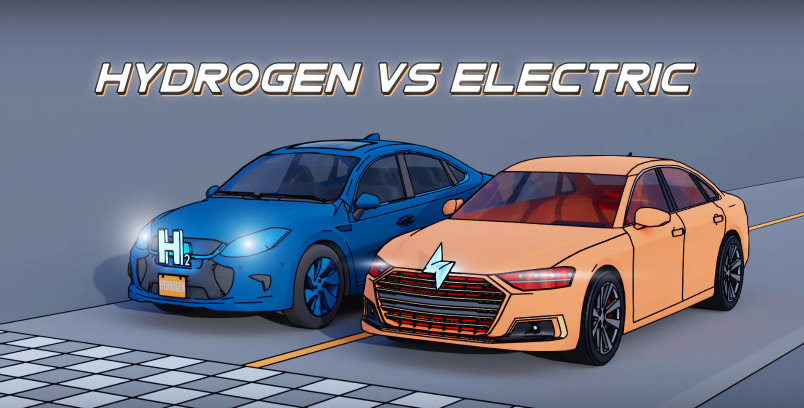Electric or Hydrogen Fuel Cell Vehicles – What is the Future?
- Electric Vehicles may not be the only future of sustainable transportation.
- Application of technologies may depend of sector needs.
- Economies need to weigh pros and cons of both technologies before making infrastructure investments.
Electric Vehicles seem to be our future, but then why are many giants of the motoring sector investing into Hydrogen Fuel Cell Vehicles.
We are in the middle of the biggest motoring revolution. Changes to the way we think about transport are probably going to happen much more quickly than you imagine. People around the world are seeking the right mix of futuristic vehicles that enable mobility with near-zero emissions. This profound shift in the mobility landscape is driven by the rise of two technologies: hydrogen fuel cells and electric vehicles – two contenders that seek to replace fossil fuel completely.
Hydrogen is the cleanest fuel around and it has powered engines since the start of 1800s. Although, the idea never really took off when it came to motoring. In contrast, the principle of using electric motors for propulsion dates back to the early days of automobiles.
The Market Verdict
It is evident that Battery Electric Vehicles (BEVs) are dominating the shift towards more environment-friendly transport than fuel cells. On a year over year basis, 162% more battery-electric vehicles were sold in the 12-months leading to November 2020 than the previous period. By 2020, the world had more than 6.8 million electric vehicles and only 32000 hydrogen cars.
The Principle
Before we begin to talk about the disparity between the sales of two, it’s important to understand the principle both these technologies use.
A hydrogen fuel cell car has the characteristics of both electric and conventional combustion engine cars. Fuel cells are the main component for all the processes happening inside the car that propel the vehicle. An HFC vehicle runs on hydrogen tanks that feeds a fuel cell with pressured hydrogen gas. This gas when mixed with oxygen starts an electrochemical reaction that produces electricity to run the motor.
On the other hand, EVs are powered by electric motors. Electric vehicles are powered by batteries that store charge just like mobile phones. However, they still need to be recharged after every 100-300 miles from half an hour to up to 12 hours depending on the range.
Key Proponents
Toyota was perhaps the first company that truly believed in zero emission and hydrogen future with Mirai – a fuel-cell vehicle that offers a range of 312 miles on a tank. Toyota Mirai emits 120g/km of CO2 over its lifetime but the work is being done to significantly bring it down by producing hydrogen from renewables. Besides Toyota, Honda has also produced fuel cells vehicles such as Clarity Fuel Cell and FCX Clarity whereas Hyundai has produced Tucson Fuel Cell.
But despite the current work done by these companies, there is a long journey ahead for the FCEVs to take over the roads as the industry still needs to adapt to the latest technologies.
Some Pros and Cons
Hydrogen fuel cells development took a back seat due to the fact that electric vehicles are already popular among the masses. Moreover, in 2019, two back to back incidents of chemical plants producing hydrogen catching fire brought home the fact that hydrogen is a dangerous explosive gas. Keeping hydrogen under high pressure requires the vehicle to be equipped with all advanced safety measures.
Also BEVs are considerably more energy efficient than FCVs when you take the process between power generation and propulsion into account. Conversion of energy from electricity to hydrogen via electrolysis is only 60% efficient. However, hydrogen is much lighter, and you can top it up quicker than charging an electric car.
Another factor to consider is the production of Hydrogen, 95% of which is produced in the United States through the process of methane reforming. A process, which also results in the generation of carbon monoxide and dioxide. Taking this into account, work is underway to obtain hydrogen from biomass, which would significantly cut the life-cycle emissions from hydrogen. Battery electric vehicles have a dark side as well. A 100kWh Lithium-ion battery that gives a potential range of 250 miles will require around 20 tons of CO2 in manufacturing. Thus in comparison Hydrogen is the cleanest fuel around.
That being said, a key hurdle in the adoption of fuel cells is the limited refueling infrastructure as it makes FCEVs a less-than-viable transport option for the masses.
Price Comparison
Hydrogen fuel cell vehicles have higher upfront and running costs. Toyota Mirai currently retails at £65,000 which is a lot to pay for any car.
On the other hand, the exponential growth in the electric car market is already pushing the prices down. Industry experts believe that by the year 2025, 20% of the cars sold will be electric.
Is there a Future For Hydrogen Cars?
In one word, Yes. This is mostly because Hydrogen is the cleanest fuel around and for a truly sustainable future this fact is hard to ignore.
Although on the personal car front electric vehicles are way ahead in capturing the sustainable vehicle market. It is almost no contest, especially when we consider the number of electric vehicles already on the road.
However, Hydrogen’s biggest advantage is lightness and quick refueling. In the logistics and mass transit sectors, limited battery capacity and long charging times can present a problem so it is here Hydrogen Fueled vehicles can truly dominate. Even though developing the infrastructure will likely take years and billions of dollars.
What do you think the emerging economies should do invest in both or just simply tie theirs sustainable future to the electric?
